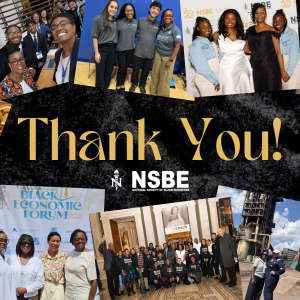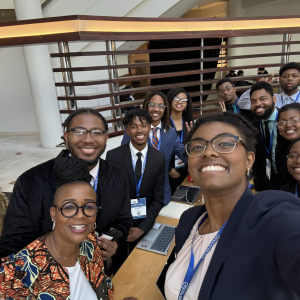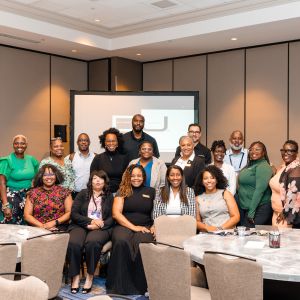Executive orders and other White House actions have made 2025 a year of change in higher education in the U.S., from elimination of diversity, equity and inclusion (DEI) offices on campuses, to cancellation of grants for science and technology research, to termination of programs to prepare K–12 students for college, to name a few examples.
To learn more about the real-world consequences of these policy shifts, we spoke with a longtime member of NSBE who is among the 2.4% of tenured or tenure-track professors of engineering in the United States who are Black.
Excerpts of our interview follow.
Are these White House actions truly transforming higher education?
So I’m going to give a maybe complex answer here. I think they’re certainly intended to completely remake what higher education is, to change it so that it’s not serving what I think the purpose of education is broadly. I think the purpose of education is to open doors and opportunities to individuals with reflection on the reality and history that we’re situated in.
The model that has been in place is in place for a reason. And part of that reason is to ensure that there’s discovery within the research realm but that that’s connected to education and the idea of broadening participation. So all of those things are interwoven and supposed to be important.
And the changes in federal funding — particularly the attacks on the NSF and the NIH and the cancellation of grants in particular areas — and the decision to state that DEI is discrimination and to make that federal policy, those are all things that are really damaging to higher education.
The characterization of DEI is providing this fantasy that DEI is discriminatory and those who are involved with DEI are in some way, shape or form inferior to others. It’s dangerous and disheartening because, at a policy level, there are individuals who are now putting in place legislation meant to close those opportunities now.
I mentioned that I’m a product of a STEM DEI program. So I would not be in the place that I am today without those kinds of programs, coming to college as a lower middle-class individual. I’m a first-generation college student as well, right? So there’s not a lot of historical knowledge from my family to tell me about the pathways that I could potentially take. Without the DEI program, I would absolutely not have known about graduate school. I would not have known how to navigate to that space and then be able to do the things that were necessary to get the support that I needed.
Now a lot of that has been completely destroyed. We’ve removed the infrastructure around that. We’ve taken away the individuals within institutions that were enabling these kinds of programs and these activities and working to change structures so that they were more equitable.
How damaging are these changes, short-term and long-term, in your opinion?
So I think in the short term, the sort of reconstruction of the funding mechanisms that are in place and the removal of funding from certain individuals around particular topics, those things are very damaging to the ability to progress within academia. So thinking just as a faculty member and the way that we currently look at what professional success looks like, we’ve taken away funding from many people across the country, and we’ve limited the amount of funding that is going to them. So now folks have to really think about, “How do I still meet this standard? What is expected within the professional space?” So there’s that part of it.
But then there’s the secondary effects of sort of changing both the model of funding and how we talk about the ways we make broader impact with funding. Given the environment we’ve essentially created within the academic space now, it’s now more of a space where we’re competing instead of being cooperative, and we’re not turning our attention towards how we open opportunities for more individuals through the work that we do. So I think we’re discouraged from doing that now, particularly in looking at things associated with race and gender.
And that’s problematic given the history of this country, right? If we’re talking about a blank slate where we did not have historical baggage, maybe we could imagine something that is different. But that’s not where we are, and that’s not the current environment.
And so all of that has an immediate effect but also a long-term effect, because it’s hard to actually build that infrastructure. I think it’s really easy to tear things down, but it’s hard to build things that have impact.
What do you see for yourself in your own career? Are you having to make big changes in your long-term plans, or are you considering doing that?
Yeah, so I’ve already made some changes. Part of the reason I am in the place where I am is because of the nonsense at the state and federal level. And I think more people will do that, but there’s an issue with that, right? Because I’m not where I was, that means there’s one less person doing that work in that area. And the Black students that are left there don’t have me there within the institution to push things in the way that an individual needs to push things through in order to make change.
So we have to figure out what the strategy is, so that it is not necessary to find a new place to be, but to still do the work and live and thrive where we are.
For others who may want to follow you into professional careers in academia, NSBE members in particular: what do you see for them?
So I think the first piece of advice is that you’re needed. The STEM education enterprise at all levels needs NSBE members to be involved and engaged. And that can be in different ways, but it is absolutely a necessity, if we want to be able to truly fulfill the mission. That necessitates understanding that even though folks will make statements to the effect of ensuring that we are in a meritocracy and that things are equal and that everything is merit-based; understanding that that is just not the case, that you have to be ready to over-perform in order to get the same things as others. But that doesn’t mean that you have to necessarily do things differently from what you’re already doing. You’re already excellent.








